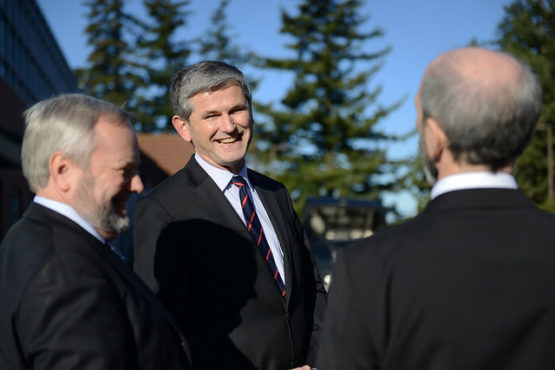Can he regain the trust of a politically exhausted province?

Andrew Wilkinson, centre, has a tough challenge ahead of him after winning the BC Liberals leadership contest. Photo by University of Fraser Valley via Flickr
With a new year comes new beginnings as the BC Liberal party elected its new leader — Andrew Wilkinson. Similar to the Federal Conservative Party leadership race that resulted in a come-from-behind victory for Andrew Scheer, Wilkinson took the leadership on the fifth ballot. His closest contender, former Conservative MP Dianne Watts, finished a close second with 47 per cent of the combined ballots to Wilkinson’s 53 per cent.
This follows a recent trend — bucked by the Federal NDP — of electing a consensus candidate to right the ship after an electoral defeat. Wilkinson comes to the table with a great deal of political experience, having been the party’s President during the early Campbell administration, and later serving as an MLA and Minister under Christy Clark’s leadership. He is a Rhodes Scholar, and worked as a doctor and a lawyer before entering politics.
Wilkinson must shake off his image as an academic and as a professional — something he tried hard to do (with mixed results) during the leadership race — to be a more relatable candidate in the eyes of many British Columbians. His roots with the Federal Liberal party, coupled with his strong fiscally conservative presence could prove a fatal combination for Premier John Horgan — if Wilkinson can keep the centre-right coalition thriving in B.C. Wilkinson will move quickly to create his new shadow cabinet, likely placing his fellow leadership contenders in key positions.
Horgan has already broken the Green Party’s trust by supporting the Site C dam project, and this fractured relationship will likely be exploited by Wilkinson and the BC Liberals
It will be interesting to see what will become of Mike de Jong, this attempt being his second time running for the party leadership. De Jong has a credible background as a competent Minister of Finance, but came under fire during the leadership campaign for not utilizing the provincial surplus to excite British Columbians in the 2017 election.
Dianne Watts is another figure to keep an eye on. Her campaign can politely be described as topsy-turvy, but she gained notoriety and trust for being the outsider: someone that could bring in a clean perspective. Watts is not currently an MLA, but will likely run in the next provincial election in her home territory of Surrey. She could very well be the difference maker for BC Liberal fortunes, potentially winning back the ridings south of the Fraser River that contributed to the the party’s provincial electoral defeat.
The coming weeks will be telling as the NDP meet their new opponents across the aisle. The government has been struggling lately to reconcile its own agenda with its coalition partner, the Green Party. B.C.’s diverse economy is heavily reliant on its natural resources and exports — anathema to the Greens, but a critical element of support amongst NDPers.
Horgan has already broken the Green Party’s trust by supporting the Site C dam project, and this fractured relationship will likely be exploited by Wilkinson and the BC Liberals as a part of their mission of taking back the government from the NDP. The ball is now in Wilkinsons court as we watch where he takes the party and how and if he can regain the trust of a suspicious and politically tired British Columbia.






